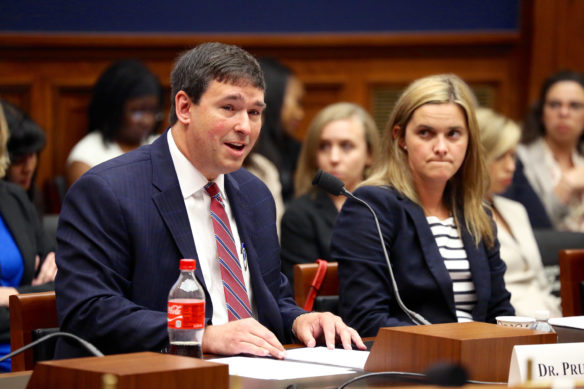
Commissioner Stephen Pruitt testified June 23 before the U.S. House Committee on Education and the Workforce in Washington, D.C., about the Every Student Succeeds Act.
Photo courtesy of Edworkforce Committee
(FRANKFORT, Ky.) – Kentucky Education Commissioner Stephen Pruitt testified before the U.S. House Committee on Education and the Workforce in Washington, D.C., earlier today, commending lawmakers for passing the Every Student Succeeds Act (ESSA), which gives states more flexibility in how they measure student success while also holding schools accountable for closing achievement gaps between groups of students.
“In Kentucky, we are working to move all children to higher levels of learning while also determining the root cause of achievement gaps, which we believe stem from opportunity gaps and access to rigorous, high quality learning opportunities,” Pruitt said.
The United States Department of Education (USED) recently released proposed regulations that would govern the implementation of ESSA. USED is accepting public comment on the regulations until Aug. 1.
During the hearing, Pruitt said while he appreciated the department’s speed in developing the proposed regulations, he has concerns they contain many restrictions and requirements. “The proposed regulations stifle creativity, innovation and the sovereignty of states to govern their own education policies,” he said.
Further, he said, the volume and complexity of the proposed regulations are in direct opposition to Kentuckians’ desire for a simple accountability system that would allow for a “broader, fairer and more accurate representation of school performance” versus a single summative score.
“In Kentucky, we found that a summative score leads to ranking and creates an unhealthy sense of competition rather than a collaboration and collegiality that supports school improvement,” Pruitt said. “We also found that, in some instances, it becomes more about adults chasing points and trying to ‘game’ the system to manage the appearance of performance, rather than actual performance.”
Pruitt also raised concerns that USED is asking states to identify their lowest performing schools based on their existing accountability systems, and then subsequently hold those schools responsible for making progress
under a completely new accountability systems. He suggested to the committee that instead states should be allowed to support their existing low-performing schools in 2017-18, and then re-identify new low-performing schools in 2018-19 once their new accountability systems are in place.
“Now, more than ever, what states need to implement ESSA is honest two-way communication, consistency and to be trusted to make good decisions. We need a common sense approach that supports a quality system of assessments, accountability and school improvement measures that can be implemented with fidelity and will promote doing what is right for kids,” Pruitt said.
Pruitt said he is concerned that may not happen if a compliance over quality mentality prevails, with the focus not being doing what is best for students, but on bureaucracy. As an example, he noted USED’s effort to force Kentucky to give students science tests that are not aligned with the state’s academic standards and report performance levels that are not truly reflective of student learning. Kentucky is currently developing new science assessments, which will be piloted in spring 2017, that align with its science standards.
“Kentucky is committed to fully realize the intent of ESSA. If this law truly represents a new day for education in America, states must have the support to take action based on quality and what is best for students and move away from the compliance mentality,” Pruitt said. “The Commonwealth of Kentucky looks forward to revised standards that empower states with the freedom to plan, innovate, design and implement quality education systems that will ensure opportunity for all students and promote the pillars of equity, achievement and integrity within Kentucky education policy.”
The commissioner’s oral testimony can be accessed here. Pruitt also provided more in-depth and detailed written comments to the committee, which can be found here.
The full hearing can be seen at https://youtu.be/uxnbGJlz66g?t=991. Commissioner Pruitt’s testimony can be found at https://youtu.be/uxnbGJlz66g?t=7867.




Leave A Comment